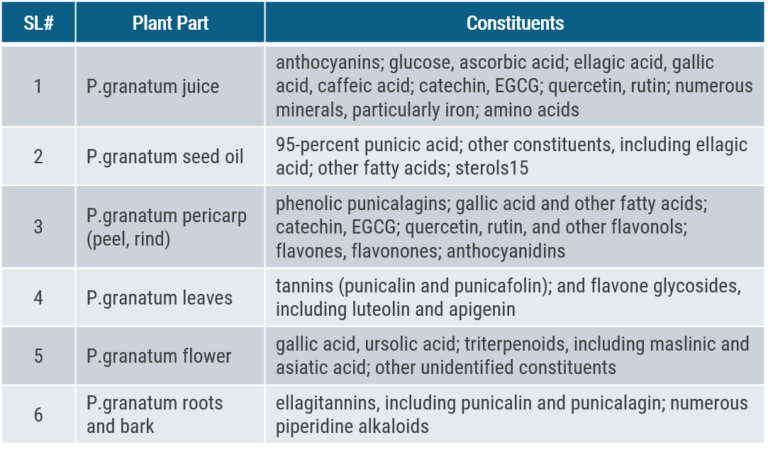Punica granatum (commonly known as Pomegranate) has attracted a lot of consumer interest and R&D interest focused on its medicinal properties. This blog focuses on its therapeutic effects based on its medicinal properties. In the past decade, numerous studies on the antioxidant, anticancer, and anti-inflammatory properties of P.granatum constituents have been published, focusing on treatment and prevention of cancer, cardiovascular disease, diabetes, dental conditions, erectile dysfunction, bacterial infections, antibiotic resistance, and ultraviolet radiation-induced skin damage. Other potential applications include infant brain ischemia, male infertility, Alzheimer’s disease, arthritis, and obesity.
P.granatum possesses a wide range of compounds, including polyphenols, alkaloids, and vitamins with a potent “free radical” scavenging properties. Free radicals can cause oxidative stress, which may induce damage to biomolecules, leading to many chronic diseases, such as cancer, diabetes, atherosclerosis, Alzheimer’s disease, nephrotoxicity (damage to kidneys), hepatotoxicity (damage to the liver) and other degenerative diseases. Antioxidant activity of P.granatum has been attributed to the presence of some components like ascorbic acid and phenolic compounds, including punicalagin, punicalin, gallic acid, ellagic acid, and anthocyanins. Tannins derived from P.granatum, especially ellagitannins have shown potent free radical scavenging properties. Punicalagins and ellagitannins are converted to urolithins by bacteria in the intestine, and these have been shown to have antioxidant activity. The red color of P.granatum juice has been attributed to anthocyanins, such as cyanidin, pelargonidin glycosides, and delphinidin, which have potent antioxidant activity.

Flowers, leaves, bark of young shoots and roots, fruit peel, and P.granatum sauce have been traditionally used. All components of Punica granatum L fruit with abundant tannins show relatively strong astringent effects. Several infusions or decoctions of the plant flowers have been used in traditional medicine to treat simple diarrhoea, vaginal discharge and also this extract accompanied with P.granatum peel have usually been gurgled to relieve inflammation of the pancreas. Refreshing juice of Punica granatum L fruit is recommended to heal gallbladder diseases. The fruit contains strong tannin considered as bitter nutrition. Its decoction appears to be helpful for treating diseases such as ordinary diarrhoea, dysentery, and stomach disorders. Tannin content of P.granatum seed, however, is not remarkable and it is usually used to treat vaginal discharge and wound healing. Fresh or dried root barks or ethanol extracts of P.granatum are used to remove intestinal parasites due to the alkaloid substances. It is also used in traditional medicine because of the antibacterial and anti-inflammatory properties. Preclinical and clinical researches have revealed that plant derived antioxidants are effective in the prevention and treatment of free radical–induced complications. P.granatum is identified as an antiparasitic fruit for both humans and livestock. The recent focus on the use of phytoestrogenic compounds in medicine for the prevention and treatment of menopause, osteoporosis, and cardiovascular diseases induced by reduced estrogen and cancer might increase the prospect of using P.granatum seed oil and juice for postmenopausal women to be replaced by internal and external phytoestrogen as an alternative to hormone replacement therapy (HRT).
The use of Punica granatum for the prevention and treatment of various health ailments has been in practice from time immemorial. It has been reported to be effective against a variety of diseases including diabetes, skin disease and cancer. These results suggest that Punica granatum extract is a good natural source of bioactive compounds capable of providing beneficial health effects. Further studies with a view to commercialise the observed therapeutic benefits would serve humankind in the long run.
References are available on demand and constitute internal knowledge repository of Consytel Life Sciences Pvt Ltd.
© Consytel 2025. Powered by WordPress
